Minds of the Movement
An ICNC blog on the people and power of civil resistance
by Erik Van der ZandenJanuary 12, 2022
After months of meticulous planning, the time had come. The activists arrived at the agreed location and quickly released the piglets, who squealed loudly while running amok…
Uganda’s Jobless Brotherhood prefers to engage in disruptive protest to gain large media coverage. Marked by a raw sense of humor, symbolism and dramatic visuals, they call this approach “creative activism.”
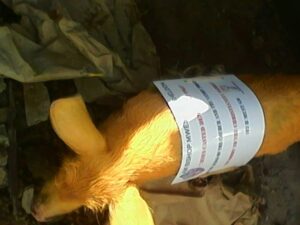
Pigs wearing declarations of politicians' corrupt acts. Source: Jobless Brotherhood Facebook page.
The power of humor is to turn serious issues into relatable “jokes.” Parody and laughter are powerful weapons for the oppressed, providing an entry point to collective action against injustice where people might otherwise feel powerless due to adversaries’ use of violence.
The idea to form the Jobless Brotherhood was born in 2013 after its founders Robert Mayanja (ex-industry worker and union organizer) and Norman Tumuhimbise (ex-police officer and author) watched the documentary Bringing Down a Dictator, which chronicles Serbia’s student-led nonviolent struggle against bloody-handed dictator Slobodan Milosevic at the turn of the 21st century. The effective use of nonviolent action to advance rights and freedom prompted them to ask themselves: If the Serbian students of Otpor! can do it, why not us as well?
The initial goal of the Jobless Brotherhood was to initiate a movement against corruption in Uganda. Attracting urban unemployed youth from Kampala, in particular men and boys, the activists hoped to inspire Ugandan youth to start believing that they could change their destiny.
Pigs in Parliament
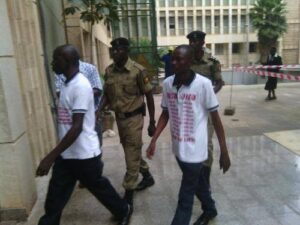
Jobless Brotherhood activists being arrested for the pig stunt in 2014. Source: Jobless Brotherhood Facebook page.
They pulled off their first action in 2014, when activists released two pigs painted yellow (the color of the ruling party) in the Ugandan Parliament while in session. The pigs were wearing tags with written descriptions of corrupt acts that ruling members of Parliament had committed. Pigs were chosen to symbolize the corrupt Ugandan elites who are “eating” public funds.
In order to infiltrate Parliament, the activists had befriended the guards for six months. They showed up every day at 10:00 to scout the location and to chat, building trust in order to gain access so they could slip through security the day of the action. One of the organizers had studied the behavior of pigs and used music in the car to keep them quiet until the right moment.
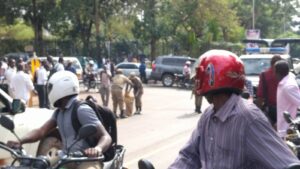
Ugandan police "arrest" the painted pigs that were released in Parliament—a comical sight for passers-by. Source: Jobless Brotherhood Facebook page.
The idea was to involve themselves in a high-risk, attention-grabbing action to make a statement about political and financial corruption in Uganda. This worked, as coverage of the stunt quickly spread throughout national and social media, functioning as a successful launch of the Jobless Brotherhood. Even though the two initiators immediately got arrested and beaten, then stayed in prison for 14 days, they received so many well-wishing visitors that the prison had to organize special visiting days.
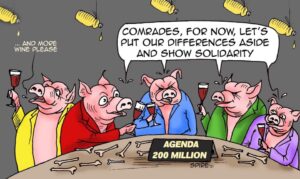
By Jimmy Spire Ssentongo via his Facebook page.
The symbolism behind the action proved to be effective. To this day corrupt members of Parliament are often called “MPigs” and portrayed in satirical cartoons as such. In the years since, symbolism, satire and disruptive protest have become much more common ingredients of nonviolent actions in Uganda, serving as a gate opener for new movement participants.
In a subsequent action in 2016, another batch of pigs painted blue and red (the colors of the opposition parties) were released in Parliament. This demonstrated that the Jobless Brotherhood was not only critiquing the despotic regime but widespread corruption in Ugandan society more broadly. Their ultimate goal was not only the downfall of the corrupt regime, but a strong corruption-free economy to create employment. And something much greater…
Regime change but also systemic change
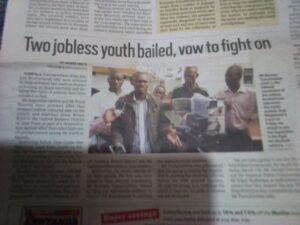
Activists succeeded at drawing media attention to corruption. Source: Jobless Brotherhood Facebook page.
The Jobless Brotherhood sees bringing down the Ugandan dictatorship as only a part of their goal. They had observed in other African countries how bringing down a dictator did not always lead to a brighter future. Even worse, they experienced how multi-party elections, supposedly a key element of democracy, were used by African dictators to gain external legitimacy to strengthen their position. As a result, they see dictators not as the problem, but as a symptom of the problem.
Former colonial powers of Africa—England, France, Belgium, Portugal, and others—are still present on the soil of many African countries and are extracting precious natural resources in the form of logging, gold mining, diamond mining, and so on. Chinese companies have also become a major actor in extractive industries in Africa over the past decade. These highly lucrative industries fuel corruption to the benefit of dictatorships and elites. As long as extractive industries continue to operate with impunity, despotic rule will endure and African peoples will suffer from poverty and joblessness.
This deeper analysis compels the Jobless Brotherhood to work towards not only democratic change, but also systemic change: the abolishment of a corrupt, post-colonial system that only benefits African elites and its replacement with more inclusive institutions that ensure economic well-being for all. Furthermore, merely the presence of elections does not equal democracy for the Jobless Brotherhood. What they find more important is a democratic society, a social-political transformation, a revolution. This will be a revolution not won through violence, but through nonviolent action.
What we hope will follow is not copied Western democratic systems, but locally-brewed African democratic systems.

Erik Van der Zanden
Erik van der Zanden is a nonviolent trainer and activist who holds a Master’s degree African Studies from Leiden University (the Netherlands). He is also a reviewer for the National Institute of African Studies (NIAS). Van der Zanden recently founded Sankara Revolutions, a Dutch-based organization that publishes blogs and knowledge products that aim to empower (African) activists to liberate themselves from corruption and oppression.
Read More